|
|
|
Sort Order |
|
|
|
Items / Page
|
|
|
|
|
|
|
| Srl | Item |
| 1 |
ID:
160674
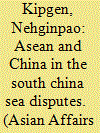

|
|
|
|
|
| Summary/Abstract |
The South China Sea disputes involve both island and maritime claims among sovereign states and the issue has long been a point of debate in international politics. It involves not only the countries in dispute but also other major world powers, including the United States. Its important strategic location and the abundant resources make the South China Sea a target of contention among the claimant countries. The arbitral ruling in July 2016 gives a new momentum to the dispute. The article examines the strategic relations of China and the Association of Southeast Asian Nations (ASEAN) by analyzing the positions and steps taken by ASEAN and China, as well as ASEAN-China joint initiatives. It also discusses the challenges and viable solutions to the dispute.
|
|
|
|
|
|
|
|
|
|
|
|
|
|
|
|
| 2 |
ID:
160675
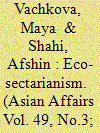

|
|
|
|
|
| Summary/Abstract |
This study introduces ‘eco-sectarianism’, which is a new concept that explains the relationship between sectarian violence and environmental pressures in divided societies in the Middle East. Against the backdrop of climate change, ‘eco-sectarianism’ poses a challenge to many fragmented and unequal societies where the sense of national consciousness is weak and nation-building projects are incomplete. This paper draws attention to the links between politicisation of sub-national identities and emerging ecological challenges in Syria.
|
|
|
|
|
|
|
|
|
|
|
|
|
|
|
|
| 3 |
ID:
160672


|
|
|
|
|
| Summary/Abstract |
North Korea's engagement in the Middle East is a six-decade long narrative. Neither the DPRK nor its Middle Eastern partners have remained still over this time; each region has undergone significant changes. In particular, the leadership of the North Korea is now in the hands of the third generation. No matter how stagnant and monolithic the country may seem at first sight, each generation has had to deal with differing commitments and adapt to changing realities. As such, each generational change of leadership in Pyongyang has arguably had repercussions on the DPRK's relationship Middle Eastern partners, which may at times have been misattributed to a fundamental change of approach. This study attempts, therefore, to probe the twists and turns in the DPRK's interactions with the Middle East since the death of Kim Il-sung, beginning with an appraisal of each leaderships’ priorities in North Korea, and how they could potentially influence Pyongyang's overall orientation toward its different partners in the region.
|
|
|
|
|
|
|
|
|
|
|
|
|
|
|
|
| 4 |
ID:
160676
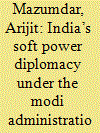

|
|
|
|
|
| Summary/Abstract |
This paper examines the Narendra Modi administration's use of three specific soft power assets of India – Buddhism, Diaspora, and Yoga – in diplomacy in service of the country's national interests. It attempts to address the following questions: What is the main purpose of the Modi administration's soft power strategy and the reasons behind the promotion and utilization of these three assets? What are the impediments to India's soft power projection ability? Finally, how can the Modi administration better exploit India's soft power advantages? This paper demonstrates how the Modi administration is making efforts to project India's soft power in the service of larger strategic goals. The use of soft power is designed to complement India's conventional diplomacy, boost its international image, project it as a peaceful rising power, improve relations with other countries, and help attract foreign investment, technology, and tourists in order to promote economic growth and development.
|
|
|
|
|
|
|
|
|
|
|
|
|
|
|
|
| 5 |
ID:
160677
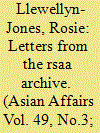

|
|
|
|
|
| Summary/Abstract |
In 2004 a collection of thirty-four letters from the Silk Road explorer Sir Aurel Stein was found in the archives of the Royal Society for Asian Affairs and catalogued, although not transcribed or studied. Neither of Stein's biographers, Jeannette Mirsky (published 1977), nor Annabel Walker (published 1995) knew about these letters, and there are no references to them in more recent publications either. What is perhaps even more interesting is that the Society's letters are addressed to a man whose name does not appear in any published works on Stein; a man who remains an elusive figure more than half a century after his death – Colonel Reginald Schomberg D.S.O. (1880-1958), an explorer and spy. This article analyses the contents of the letters, which shed light on a secret mission undertaken by Schomberg in Chinese Central Asia in the early 1930s.
|
|
|
|
|
|
|
|
|
|
|
|
|
|
|
|
| 6 |
ID:
160671


|
|
|
|
|
| Summary/Abstract |
The overlapping territorial and maritime claims in the South China Sea threaten to spark conflict in East Asia. On several occasions in recent years, disputes over the right to extract oil and gas have caused clashes between Chinese and Southeast Asian vessels. The United Nations Convention on the Law of the Sea (UNCLOS) was agreed by almost all countries in 1982 to try to resolve such disagreements. However, the People's Republic of China is currently trying to claim rights that go beyond UNCLOS and infringe on the UNCLOS-based rights of the other claimants. It deploys two arguments in particular: that the archipelagos in the South China Sea collectively generate rights to maritime resources and that China enjoys ‘historic rights’ in the sea. Neither of these arguments is found within UNCLOS, however. This article explores the origin of these Chinese arguments and finds that the ‘historic rights’ claim can be traced to a single Taiwanese academic writing in the 1990s during a period of intense debate in Taiwan over its relationship with the PRC.
|
|
|
|
|
|
|
|
|
|
|
|
|
|
|
|
| 7 |
ID:
160673


|
|
|
|
|
| Summary/Abstract |
This paper analyzes the policy remedies for dealing with North Korea's nuclear weapons and missile programs. After six nuclear tests and three recent successful ICBM tests, North Korea is close to miniaturizing nuclear warheads and establishing a reliable delivery system, thus achieving a much-feared nuclear weapons capability. In defiance of the extraordinarily tough U.N. Security Council resolutions, Pyongyang persists in developing nuclear weapons. North Korea's nuclear weapons program already has exceeded the strategic patience, of the U.S.-ROK alliance. Harsher policy options to deal with the DPRK nuclear weapons are imperative. Several drastic options, including severe sanctions, preventive bombing, nuclear armament of South Korea, are evaluated in the final round of engagement policy on guaranteeing nonaggression and a peace agreement with Pyongyang.
|
|
|
|
|
|
|
|
|
|
|
|
|
|
|
|
| 8 |
ID:
160670
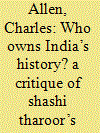

|
|
|
|
|
| Summary/Abstract |
The historiography of Britain's colonial past has always been problematic, shaped by conflicting mythologies about Britain's role as benefactor or exploiter. In the wake of Indian independence in 1947 it was in the interests of India's national identity to present what had gone before as a period of unmitigated oppression challenged by a united people. The consequence was widespread ignorance about the realities of British rule and of the Indian economy prior to and after British rule, exemplified by a current best-seller written by a well-known Indian political figure, Dr Shashi Tharoor, whose main arguments are examined; in particular, his central claim that India was a wealthy nation prior to Britain's colonial intervention reduced to poverty by Britain's ‘depredations’.
|
|
|
|
|
|
|
|
|
|
|
|
|
|
|
|
|
|
|
|
|